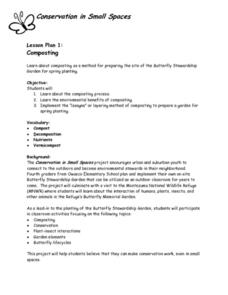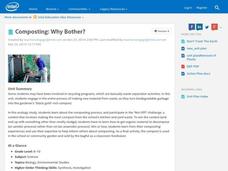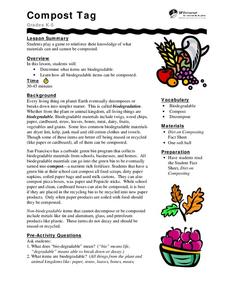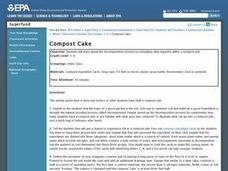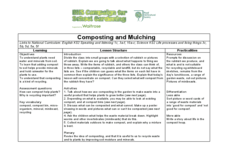Curated OER
Conservation in Small Places - Composting
A fabulous instructional activity introduces the art of composting to your gardeners. In it, youngsters learn about the composting process and how it actually works. They discuss the environmental benefits of composting, and use the...
Curated OER
Learning About Composting
Students can create a compost pile to learn about the decomposition process.
National Park Service
Reduce Our Carbon Footprint, Let’s Compost!
Roll up your sleeves and get a little dirty with this elementary and middle school compost lesson. All you need is a large plastic container, a couple old newspapers, some organic waste, and a few hundred worms and you're ready...
Intel
Composting: Why Bother?
The first STEM lesson in a group of 10 explores composting. After discussing how to make a better tomorrow, classes are challenged to track garbage in their communities, visit a local waste management facility, and conduct a survey...
SF Environment
Compost Tag
Composting is a great way to get children involved in recycling. First, they discuss how biodegradable products decompose to make compost. Then, they talk about what can and cannot be composted. They play a game similar to around the...
SF Environment
Pre-School Composting and Recycling!
You can never be too young to get involved in composting or recycling. Here is a lesson plan that has been made for the very littlest learners and it's all about the importance of conservation. They'll sort compostable and recyclable...
Captain Planet Foundation
Worm Your Way Out of This
How can you provide healthy soil for your garden? Study worms, bacteria, and other microorganisms in a lesson about decomposition and organic compost. After discussing what you know about worms and watching a video, watch what worms do...
Science Matters
Crawly Composters
Get your hands dirty with an interactive instructional activity that showcases the process of decomposing and returning nutrients back into the soil. After building a compost pile, pupils regularly observe the...
Curated OER
Nutrients Nutrients We Need
Second graders examine the six nutrients humans need to maintain good heath. In this ecosystem lesson plan, 2nd graders learn about how plants grow and compare how humans need nutrients from plants to how plants need nutrients from the...
Curated OER
Composting
Young scholars survey what composting is. They observe the benefits of composting over the course of the school year by making your own composters and gardens. Group members compare two different compost piles, make conclusions about...
United Nations
Compost Monitor Training
What should go in the trash, and what can be composted? Guide your young conservationists through the process of composing their trash with a lesson about the different ways we can dispose of garbage. Using a trash bag with clean...
Cal Recycle
Conserving Natural Resources
Trying to plan an engaging elementary science unit on natural resources? Conserve your energy! This five-part series of lessons and hands-on activities has exactly what you need to teach young scholars about the importance of conservation.
Curated OER
Compost Cake
Students examine the decomposition process. They create their own class compost pile and record their observations. They discover which materials decompose at a different rate.
Curated OER
Composting Conundrum
Students research cafeteria composting. In this composting lesson, students design a vessel that would allow the cafeteria staff to collect food scraps for composting. Then students build a prototype and present it to the class. Lastly...
Curated OER
Compost in a Bag!
Fourth graders experiment to see which objects decompose. In this compost instructional activity, 4th graders observe the changes of labeled objects in a bag. Leave the objects for one month and record the changes by observation and...
Captain Planet Foundation
Rotting Away
What happens at the end of a plant's life cycle? Show kids the natural way that plants show that they're decomposing, as well as the importance of compost, with a lesson about living organisms. After reading Log Cabin by Anne Schreiber,...
Curated OER
A Design You’ll Dig: Designing a Habitat for Worms
Middle schoolers discover how worms contribute to the balance of the environment. In this composting lesson, students study the composting and decomposition processes. Middle schoolers then create habitats for worms that allow them to do...
Curated OER
Composting and Mulching
Second graders define composting and recognize what can be composted. In this composting and mulching lesson, 2nd graders classify objects or pictures as good or bad for composting. Students write a story about life in the compost...
Curated OER
Composting With Worms
Third graders predict what happen in two (control and experiment) containers -- one with soil and trash, the other with soil, trash, and worms.
Texas Commission on Environmental Quality
Environmental Sciences
Whether you are teaching environmental science in junior high or studying recycling in kindergarten, there is something for all in this set of lessons designed for environmental education. The 110-page packet comes with tips for...
SF Environment
Sort and Color!
Sorting is a very important skill that can be used in math and even science. Learners get familiar with some environmentally friendly vocabulary terms as they practice separating objects that can be recycled from those that can't. They...
Curated OER
Composting
Learners discover the concept of decomposition. They examine how it makes the soil more fertile and how it helps plants. They put a compost bin in their backyard and record their observations.
Curated OER
Garbage in the Garden
Learners create their own compost. In this soil lesson, students fill a bag with waste and soil, in order to create a mini compost bin. Learners observe the baggies over a 6 week period, they record their findings and collect data...
Curated OER
Worm Composting
Second graders discuss worm composting. In this decomposition activity, 2nd graders look at the anatomy of the worm and how it eats food. They have their own worm bin and review what foods can and can not be given to the worms for...


